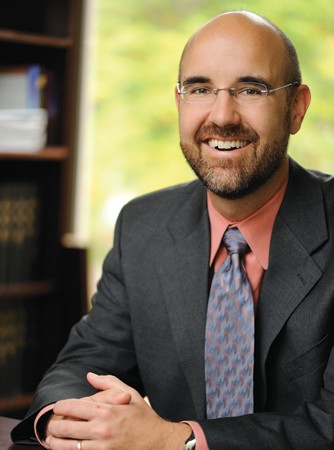"Everyone is entitled to his own opinions but not his own facts" runs a quote attributed to the late senator and ambassador Daniel Patrick Moynihan.

Image caption: Sean Fahey, vice provost for institutional research
Image credit: Will Kirk / Johns Hopkins University
Sean Fahey, who recently completed his first year as the university's vice provost for institutional research, knows this nugget well. His office is charged with compiling and conveying all the nuts-and-bolts numbers and facts related to Johns Hopkins. If a journalist wants to find out how much the university spends annually on research, or a dean needs to know how many students from Korea are on campus, the Institutional Research Office is the place to contact. The office is made up of a team with expertise in data analysis, database management, and learning assessment. It works closely with peers in partner offices across the university, including registrars, admissions and financial aid officers, financial analysts, and research program administrators, to find and frame the needed answers to a plethora of questions.
The thing is, Fahey's learned that—with no slight to Mr. Moynihan—folks are entitled to their own facts. It all has to do with who wants to know what and why.
"Hopkins is famously decentralized, and every school not only has its own data collection systems but also its own definitions," Fahey says. "We work hand in hand with the experts across the divisions to translate their division's data into a cohesive university story."
So, if someone asks him, "How many students are there at Hopkins this term?" Fahey first has to figure out what they really want to know. Full-time and part-time together? Do students overseas count? Online students? And what "term" are they talking about? Many schools use semesters, but the School of Public Health has five terms. The evening programs, meanwhile, have totally different types of terms.
"What strikes you as a straightforward question requires work," Fahey says. "The challenge for our office is not just to find the data and make sure it is of acceptable quality but to make sure it speaks to what people need to know so we are delivering the right numbers in the right context."
The roots of the Institutional Research Office are less complex and date back several years to the internal desire for improved data to measure institutional effectiveness combined with compliance requirements related to receiving funding and grants from federal and state governments. Those entities need to know certain facts and figures regarding the size and makeup of the student body and faculty, among other things. External institutional rating and ranking organizations, such as U.S. News & World Report, increasingly require such data, too.
The Institutional Research Office continues to address these informational needs while increasingly focusing services internally. "The university wants to move much more aggressively toward data-driven decision making," Fahey says. "Our job is to figure out what the decisions are that the leadership across the university needs to make—whether it's the board, the president, the provosts, or the deans—and then figure out what data we could bring to that decision-making process that could lead to an improved university."
The drive is on, too, to increase the quality and quantity of data readily available online. Toward this aim, the office has been building dashboards for improved access to institutional data, and this spring it is launching a Fact Store accessed from the provost's website offering one-stop shopping for customers from around the university who are in search of facts, figures, and reports about Johns Hopkins on topics ranging from faculty and staff demographics, to enrollment trends, to community engagement and economic impact. The store will link to existing resources scattered around jhu.edu and also will include new content. Extending the store metaphor, the site will be a "consignment shop" with university subject matter experts in each area curating and validating the relevant content.
More far-reaching goals call for improving the search results for people visiting the main university website. For instance, if someone visits jhu.edu looking for information about, let's say, the disease diabetes, Fahey wants to fashion a system where typing it in the search field brings up a well-curated and organized display listing the university's experts on the disease, the centers and institutes doing work on it, and the latest published research and articles.
"This data exists in different silos, but we've never, as a university, pulled together an index that really makes it easy for people to find," Fahey says.
Posted in University News
Tagged university administration, sean fahey







